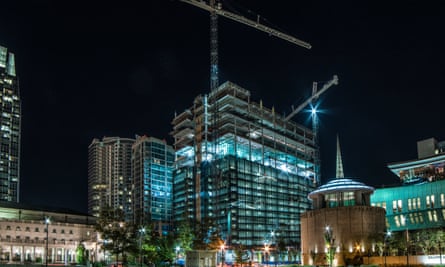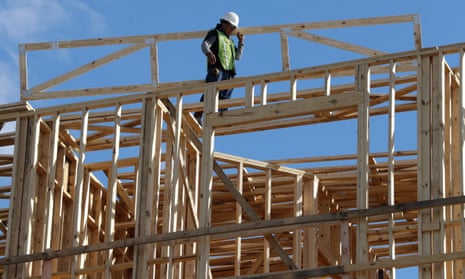Nashville is booming. The city’s population grew by 11.6% between 2010 and 2016, according to the US Census Bureau. With more than $13bn being invested into new construction in the region, Nashville’s skyline now boasts more cranes than even New York City.
But there is a dark side to the building boom. Workplace safety advocates say in the rush to build America’s next “it” city, workers are paying with their lives at alarming rates.
In 2016 and 2017, 16 workers were killed on construction sites in the city – the deadliest two-year stretch in over three decades according to an analysis performed by the Tennessean. Half of those killed in the job were Latino in a city where Latinos make up only 10% of the population.
That population is growing fast, too, as anyone attending the recent US-Mexico soccer match in Nashville could testify. The Latino population has more than doubled in Nashville over the last decade, driven by a shortage of construction workers that has become so acute that employers have found themselves unable to bid on work because they lack workers to complete projects.
Despite the boom, construction workers still make just $14 an hour on average in the Music City. And workplace safety advocates say there is widespread abuse of workers that creates unsafe conditions for all in a sector where many know that they can be easily replaced by undocumented Latino workers.

The culture of fear and intimidation on construction sites has led to basic safety precautions being overlooked. Nashville is currently the most dangerous city in the south for construction workers, according to a report released in May 2017 by the Partnership for Working Families, Workers Defense Project and the University of Illinois at Chicago professor Nik Theodore, titled Build a Better South: Construction Working Conditions in the US South.
And an analysis of state Occupational Safety and Health Administration records performed by the Tennessean found 11 of the 16 workers killed on construction sites in 2016 and 2017 died as a result of not wearing a safety harness to prevent against deaths from falls.
“They treat us like mules, they will break you down and then throw you away,” construction worker Ernesto Rivera told the Guardian. Rivera said that he has often kept his mouth shut about injuries at work in order to keep his job.
But there are signs of change. Recently, a new coalition of Latino, black and white workers, working with city council allies on Nashville metro council, put pressure on Major League Soccer to agree to a series of improvements for workers on its football stadium. The deal was signed last week.
The landmark community benefits agreements include provisions for the construction of affordable housing in the nearby areas, a minimum wage of $15.50 for all workers at the soccer stadium, and priority in awarding contracts to contractors with good workplace safety records.
“This is a sea change in how we do business in Nashville, including labor protections,” said the Nashville metro councilman Freddie O’Connell. “It’s not clear if this will be the norm, but once you do your first [Community Benefits Agreements], it does make it easier to do another one.”
Painters union organizer Rosa Ponce said: “A lot of investors and contractors think that they are ones investing. They say that we are taking all the risks, but at the end of the day, it’s workers that taking are a risk with their lives every day on these jobs sites.”
Ponce’s union is investing heavily to organize Latino workers in Nashville, where it currently has no traditional dues-paying members covered by union contracts that are Latino. Often Latino construction workers, despite being heavily skilled, are unable to join traditional unions because they lack documentation.
Last spring, the painters union launched a new worker center under the banner of Alianza Laboral that will allow workers in non-union workplaces to join the union as an affiliate member at half the dues of those covered by the union contract. The aim is to mobilize whole communities that otherwise couldn’t be a part to feel a sense of belonging in the labor movement.
As school prepared to start up late last month painters union organizers ran around frantically inside Glencliff elementary school as several hundred kids lined up for class.
“Make sure every kid has a Blow Pop, a popsicle and a box of popcorn,” yelled one organizer.
For many of the parents of the low-income, primarily Latino Glencliff elementary, the promise of backpacks stuffed with books and school supplies was a welcome relief to the many families trying to scratch by on the paltry wages of day laborers and domestic workers.
“This is about showing the Latino community that the union is something different,” said Ponce, who is heading the union’s new worker center. “It is about really making the union a part of the community.”
The union has also led efforts to successfully fight deportation proceedings while other construction unions have shown less willingness to fight back.
While many of the white southern workers have held racial hostility to many of the Latino workers, fearing they will take their jobs, the painters union is working hard to persuade white workers in Nashville that they share common cause with their immigrant co-workers.
“It’s not an easy job,” said Roger Hester, director of organizing for the painters union in Tennessee and Kentucky.
“It’s all about educating them. You hear a lot of things like ‘They are coming to take our jobs, they are coming to our jobs’, and that’s just not the case,” said Hester. “What we tell [white] workers is that we need to raise the bar for them in order to raise the bar for us. If we let these people be exploited and mistreated, we are next.”
